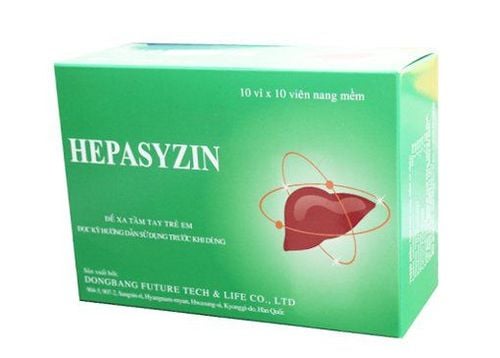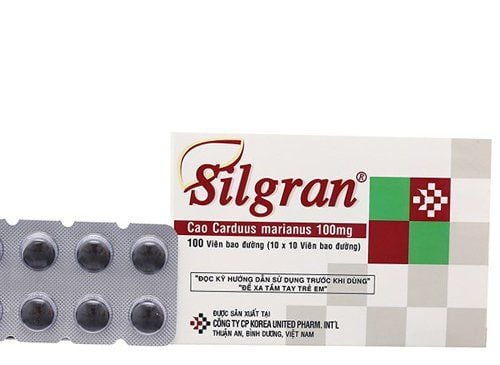This is an automatically translated article.
What is Vithalivermin? What are the notes in dosage as well as how to use it specifically? Users can refer to the details in the article below to understand the drug Vithalivermin.
1. Learn about Vithalivermin
The brand name drug is Vithalivermin. The composition of the drug includes active ingredients such as:
Cardus marianus ext extract (As Silimarin 90mg, Silybin 50mg) content 200.00 mg; Thiamine nitrate 8.00 mg; Riboflavin 8.00 mg; Pyridoxine hydrochloride 8.00 mg; Nicotinamide 24.00 mg; Calcium pantothenate content 16.00 mg With excipients just enough 1 tablet. The drug is prepared in the form of soft capsules, packed in a box of 12 blisters, each blister of 5 tablets. The unit responsible for production is GR Scherer Korea Limited.
2. Uses of Vithalivermin
Vithalivermin is a prescription drug (ETC) and used to treat liver diseases such as fatty liver, chronic liver disease, liver toxicity.
Drugs are often prescribed in cases such as:
Anorexia, weakness, digestive disorders; Support to protect liver cells in cases where many drugs or chemicals are used; People who are in convalescence due to infection, surgery, or prolonged illness; Supportive treatment in polyneuritis, neuritis; Helps strengthen the detoxification functions in the liver, supports the treatment of chronic allergies, pimples, acne.... Used in cases of liver dysfunction such as fatty liver, inflammation. Viral liver disease, cirrhosis, hepatitis.
3. Recommended dosage of Vithalivermin
Adults: Take 1 tablet once a day or 3 times a day, 1 tablet each time;
Children: not recommended for use in this dosage form.
The above dose is only a suggestion, it may change according to the condition of the patient. To have the most accurate oral dosage for your condition, you should consult and use as prescribed by your doctor.
4. Cases of not using Vithalivermin
People with a history or continuing allergy to any of the ingredients; Do not use for people with primary cholestatic cirrhosis , obstructive jaundice and hepatic encephalopathy ; People with chronic stomach ulcers; Do not use for people with severe hypotension, arterial bleeding.
5. Side effects and notes of Vithalivermin
The drug can cause some side effects such as: diarrhea, upset stomach and nausea. Therefore, when experiencing side effects or suspected to be caused by the drug, you need to notify your doctor immediately for the most appropriate treatment.
Need to consult and have a doctor's prescription to use the drug for pregnant and lactating mothers. There are no reports of the drug when driving or operating machinery.
6. Vithalivermin drug interactions
The diuretic furosemide may increase Vitamin B1 deficiency;
Vitamin B6 will reduce the effect of levodopa in the treatment of Parkinson's; however, there was no effect on the levodopa-benserazid mixture;
In women using oral contraceptives, Vitamin B6 can help reduce depression, while oral contraceptives will increase the need for Vitamin B6 supplements;
The ability to absorb Vitamin B2 in the intestines will be hindered by alcohol;
Absorption of Vitamin B2 in the stomach and intestines may also be impaired when taken with Probenecid;
Rhabdomyolysis may be increased with concomitant use of HGM-CoA reductase inhibitors and Probenecid;
There is a risk of excessive hypotension when alpha-adrenergic blocking agents for hypertension and Nicotinamide are used together;
It is necessary to adjust the diet and dosage of hypoglycemic drugs or insulin when co-administered with Nicotinamide;
Nicotinamide should not be used with drugs containing hepatotoxicity because it will increase toxicity to the liver;
Carbamazepine concentrations will increase causing toxicity if Carbamazepine and Nicotinamide are used simultaneously;
Above are the shares about the use of Vithalivermin, patients should carefully consult the information and use the drug as prescribed by the doctor to get the best treatment results.













